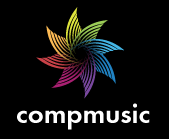CompMusic Seminar: Tools for Carnatic music exploration

09:00h: CompMusic and the development of music exploration tools for Carnatic music, by Xavier Serra, Hema Murthy and Preeti Rao
09:45h: Dunya: A web tool for exploring a Carnatic music collection, by Alastair Porter and Vignesh Ishwar
10:30h: Coffee break
11:00h: Computational tools for the exploration of melodic characteristics, by Sankalp Gulati
11:30h: Computational tools for rhythm analysis, by Ajay Srinivasamurthy
12:00h: Computational tools for knowledge-driven music browsing, by Gopala Krishna Koduri
12:30h: Lunch
14:00h: Panel on Indian music and the new technologies. Panel members: Suvarnalata Rao, N. Ramanathan, Arun Prakash, Shri Sriram Parasuram; moderator: Xavier Serra
15:15h: Coffee break
15:30h Panel on commercialization opportunities of the music exploration technologies. Panel members: Suresh Gopalan, V. Ramnarayan, Rithvik Raja, Tanjore K. Praveen Kumar, Sridharan Sankaran; moderator: Akshay Anantapadmanabhan
16:45h: End of seminar
CompMusic and the development of music exploration tools for Carnatic music, by Xavier Serra, Hema Murthy and Preeti Rao [slides, video]
The major development effort in CompMusic is a set of tools with which to better explore and appreciate the musical richness and personality of particular musical repertoires. Our first results in this direction are a set of computational tools with which to explore a collection of Carnatic music recordings and we want to share these initial results with the Carnatic music community, the targeted users of these tools. We want to get feed back from them to better define the next steps of our research. We have developed technologies to analysize and describe melodic and rhythmic aspects of the music and have also develped a web platform with which to use these technologies to explore a data repository composed of audio recordings plus related information about the music. In this presentation we will introduce the overall aims of CompMusic and the particular ones for the case of Carnatic music. The specific details about the developed tools will be given in the presentations that follow this one.
We present an initial prototype of Dunya, a music browsing tool designed to support the exploration of a Carnatic music collection by using concepts relevant to the Carnatic music tradition. This web application displays the typical information shown in music playback systems, but also includes related information collected from a variety of sources and representations of the music that have been automatically computed from the recorded audio and that are specific to Carnatic music. With this tool a user will be able to explore the music collection in ways that promote the discovery of interesting and musically relevant relationships. In the presentation we will show the functionality of this first initial prototype, demonstrating the usefulness that it might have for music lovers to better appreciate this great music tradition.
Structuring the information in a data repository in a way that is domain specific, greatly improves the possibilities for exploring and using the content of the repository. This is the main goal of the growing field of semantic web technologies. With these technologies we can interlink information entities to discover and infer new facts by observing patterns and using heuristics. In this presentation we first present the way in which Dunya structures the information we have gathered and then introduces the way in which similarity measures between the different musical entities of the repository can be developed using this structured information.
Technology has been an integral part of Indian classical music for a long time. For example, recording and amplification technologies had an major influence in shaping what this music is today. More recently the information technologies have started to be used extensively, for example for the online distribution of music recordings or for sharing information about this music through web portals. It is not clear what will be the impact of these new information technologies on the Carnatic and Hindustani music traditions and on the stakeholders of these musics, like performing artists, sabas, record companies, music schools, rasikas,…. In this panel we present and discuss different views on how the Indian classical music world is being affected by technology in general and by the information technologies in particular. The panel members will also react to the computational tools that are presented in the previous talks.


